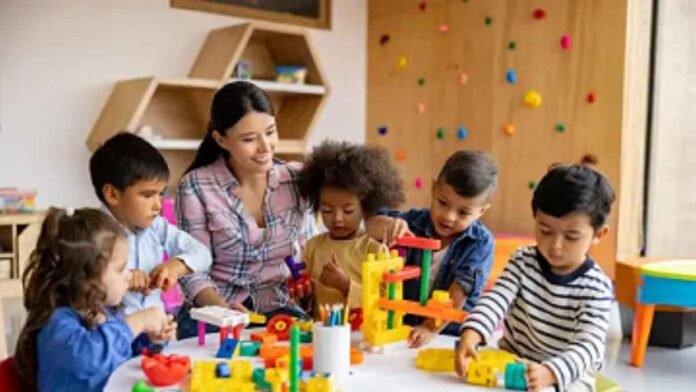Childhood is a time of boundless power, curiosity, and innocence. It is a section in which gaining knowledge of and play are intertwined, forming the bedrock of holistic improvement.
The essence of being a child is exploring the sector through play, which is an essential link between education and the pure joy of discovery.
This knowledge dates returned to the historic Indian Gurukul system, wherein play and practical sports taught existence talents, combining educational, bodily, social, and moral education. Building skills in children while they are young must be our top priority, adding fun games and elements while doing the same is a good strategy.
Social interplay and teamwork
Social interaction and teamwork are fostered through collaborative sports and group mastering. Children learn how to proportion, speak, and work together toward common goals, which helps them increase sturdy interpersonal capabilities. This method is reflected in contemporary instructional practices that focus on real-world knowledge of connections. By engaging in hands-on activities and initiatives, youngsters these days retain to construct those important social competencies, getting ready for teamwork and collaboration in their future endeavours.
Resilience
The demanding situations encountered for the duration of play teach children resilience. They navigate boundaries, adapt to new conditions, and persevere no matter setbacks. These experiences cultivate a mindset of growth and backbone. In contemporary education, experiential getting-to-know sports provide similar opportunities for children to broaden their resilience. By tackling actual-world problems and situations, they study to triumph over problems and construct intellectual longevity.
Self-confidence
Successfully studying new talents and tasks in the course of playtime enables youngsters to instil an experience of accomplishment and self-perception. Today, we see that experimental getting-to-know methodologies retain to emphasize the significance of self-self belief. Children interact in sports that test their competencies and encourage them to take dangers, supporting them to broaden a strong sense of self-confidence and confidence.
Emotional intelligence
Understanding and handling emotions is one of the most important abilities children grasp via play. Role-playing and ingenious activities assist them to empathise with others and comprehend one-of-a-kind emotional expressions. This early development of emotional intelligence is important for forming healthy relationships and navigating social complexities. Modern schooling systems are play-primarily based on gaining knowledge to beautify emotional intelligence, permitting youngsters to coach empathy and emotional regulation in supportive surroundings.
Physical health
Physical sports sell overall health and fitness. Playful sporting events and video games help kids expand motor talents, coordination, and physical electricity. The emphasis on physical health is maintained through established play and sports sports. These activities now not handiest hold youngsters physically energetic but additionally decorate their cognitive capabilities, supporting standard improvement.
Real-World Learning Connection (RWLC)
This concept mixes traditional and cutting-edge strategies for early youth improvement. By connecting academic concepts with real-life reports, inclusive of discipline journeys to nearby groups, RWLC helps youngsters see the sensible relevance of their studies. For instance, a go-to to a bakery illustrates chemistry (baking), mathematics (measuring), and economics (enterprise operations). This arms-on method fosters curiosity and enhances mastering both at faculty and at domestic.
Experiential mastering
Experiential gaining knowledge leverages kids’ herbal interest and desire to discover. It involves sports that encourage gaining knowledge through doing things which can be particularly powerful at some stage in the developmental section of zero-6 years. These activities are designed to be toddler-focused and play-primarily based, promoting independence and social interplay.
For example, programs that take learning out of doors in the conventional classroom setting, consisting of nature walks, camping journeys, or adventure sports, promote physical fitness and educate children approximately ecology, teamwork, and building survival skills. Through experiential learning, children join academic concepts with practical reviews, making schooling a fun and impactful journey.
From historic academic systems to trendy pedagogical procedures, the significance of play in constructing lifestyle abilities is plain. This International Day of Play, allows us to embrace the beauty and magic of having a laugh at the same time as mastering and encouraging our children to revel in every moment.



